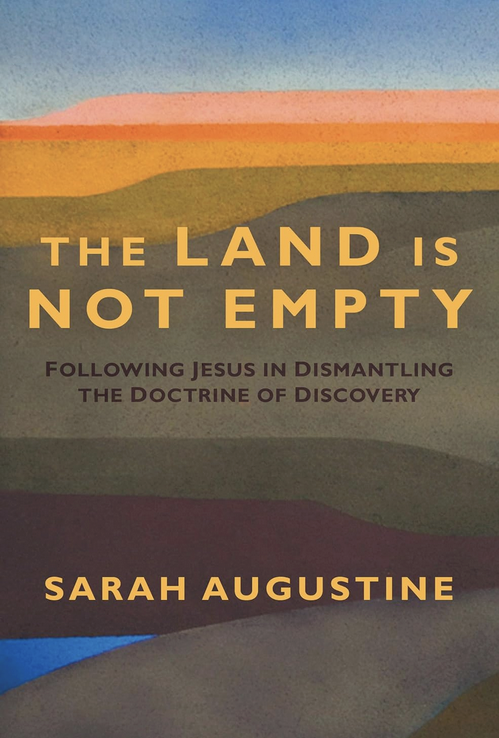Book Review: “The Land is Not Empty”
by Sarah Augustine

The Land is Not Empty/span>
by Sarah Augustine
Herald Press, Virginia, 2021
Since the Doctrine of Discovery undergirded everything about colonialism, its consequences are ongoing. It’s the basis for indigenous peoples around the world still being forced from their lands, deprived of their resources, driven into poverty. Enshrined into the USA constitution by a 1823 Supreme court decision, it was cited as recently as 2005.
Co-founder of the organization dedicated to dismantling the doctrine, Sarah Augustine, Native American and Mennonite, clearly spells this out in The Land is Not Empty.
In the beginning, rulers deputized the church to do the work. Its ‘good news’, an ultimatum of eternal damnation or deadly invasion, was read in Latin by a priest standing on a boat. The vanguard of this work is still missionaries beholden to governments’ ‘good will’ that has damaging consequences for Indigenous people.
Now disguised as economic development, colonialism has always involved force and violence. Making compromising deals with local governments in exchange for infrastructure, etc., mining companies get environmental protection and labour laws removed. Governments sell vast resource-rich sections of ‘empty’ lands still occupied by indigenous peoples to companies then free to do as they wish without accountability.
Driven out, Indigenous peoples have no standing, no access to justice. Being without land runs counter to what they knew about how to be human, completely breaking down their economic and social systems. Private property, ‘sacred’ in the US, erodes community and collective identity, survival strategies fundamentally core to humanity.
Resource extraction, the world’s current economic engine, causes injustice by oppression, objectification and exploitation of human beings, every bit as destructive to humanity as was the economic engine of slavery. Except extraction adds destroying humanity’s ability to dwell on the earth.
With legal obstacles removed, the companies externalize the real social, environmental and economic costs of doing business (health, housing, food) onto society. Thus through the global economic policy of domination and displacement of Indigenous Peoples, the Doctrine of Discovery is continuous and legal. Because it is so baked into our system by our policies, practices, institutions and assumptions, the suffering is unseen except by those enduring it.
While we demand peace and non-violence from the vulnerable, we’re blind to the many forms of violence to which they’re constantly subjected. Structural system problems can’t be solved by individual solutions because that removes responsibility from the principalities and powers legally doing damage for profit. The Bible says God’s people are responsible not only for individual sins, but also for structural evil.
Largely symbolic with intellectual actions, our ‘solidarity’ costs us nothing, as we still benefit from the status quo, while their misery, sacrificed on the altar of extraction, fuels the world’s economic engine. Solidarity is a conscious change in position, from good-intention-fixer to standing-with, placing ourselves, our congregations, our faith institutions between the systems of death and the vulnerable
She quotes an activist telling her “The church itself is a conquered people. Having signed a treaty with the state, they get tax exemption for staying out of trouble .” Augustine offers alternate interpretations for Bible stories used to justify land grabs. Citing Matthew 15:21-28, she strongly suggests the Church should be like the Canaanite woman towards corporations and governments: “I demand you deal with me. Are you really who you say you are?” Further, she asks, “Is the church standing where it says it is?”
Christianity’s focus should be on the restoration of life and the systems of life, redemption for all creation. The Indigenous concept of ‘all our relations’ understands humanity not as separate from creation but as part of the web of life. Thus, following Jesus’ teachings, we become collectively accountable for structural injustice and collectively obligated to work restoring justice both for the oppressed and systems that sustain life.
~~~~~~~~~~~~~~~~

